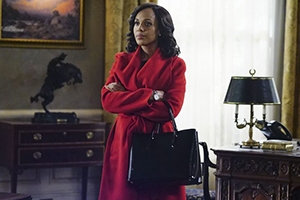Television & Film
AU in ShondaLand

Scandal star Kerry Washington is part of Shonda Rhimes' popular "Thank God It's Thursday" lineup. Photo Credit: Disney and ABC Television Group.
During the first season of the ABC TV series Scandal, Olivia Pope gets the brush off from Amanda, a flustered, would-be client. But Pope, a crisis communications guru, tells one of her underlings, Quinn, to slide her cell phone number under Amanda’s door, anyway.
“Wait. How do you know she’s going to call?” Quinn asks. “Because I’m very good at my job,” Pope responds.
Like her Pope character, series creator Shonda Rhimes is quite good at her job. With her own TV production company, ShondaLand, Rhimes is the showrunner of hit ABC shows Scandal and Grey’s Anatomy, and she co-executive produces legal thriller How to Get Away with Murder and a new series, The Catch.
Rhimes is also ushering in broader diversity on primetime TV, and that’s one reason why ShondaLand is worth exploring in an academic setting. This fall, American University instructor Stef Woods will teach “The Shonda Rhimes Experience,” an American Studies course with an interdisciplinary mix of marketing, social media analysis, film and media arts, and Women’s, Gender, and Sexuality Studies.
“We can learn a lot from what she’s presented, and from how Rhimes and her shows have been received,” says Woods.
Depicting the Real America
Even as recently as the 1990s, TV was sorely lacking in diversity. You could watch entire seasons of Friends and Seinfeld with hardly a person of color in sight. Rhimes, herself an African-American woman, created TV that looks much more like modern day America. Breakout star Kerry Washington, who plays Pope on Scandal, was the first African-American female lead in a network drama in decades. Another African-American woman, two-time Oscar nominee Viola Davis, was later cast as the lead in How to Get Away with Murder. Rhimes launched two other shows, Grey’s Anatomy and Private Practice, that were both heterogeneous and female centric.
“I think it’s representation in a way that’s presenting characters like real woman, and real women of color,” says Woods. “It is Viola Davis basically insisting, ‘I need to take off my wig and my makeup. I need to show that I’m a multidimensional woman in this role.’ To have Kerry Washington’s character be the one who handles things—to be the fixer.”
As TV studios incorporate more racial and ethnic minorities, some critical reactions have provoked online blowback and controversy. In a widely derided review of Rhimes’ work, The New York Times declared that “when Shonda Rhimes writes her autobiography, it should be called ‘How to Get Away With Being an Angry Black Woman.’”
Woods believes even misguided or insensitive analyses can provide teachable moments for her students. “It’s important that we talk and we educate people about moving beyond those tropes, and talk about why those stereotypes are both wrong and dangerous,” she explains. “Historically, the label, 'angry black woman,' has been used to belittle, silence and further marginalize black women for trying to speak up for themselves. To use that term to describe Shonda Rhimes is insulting and attempts to undermine her accomplishments.”
Above all, Woods views Rhimes’ characters as living, breathing people. They shouldn’t be strictly defined by their color or gender, but those minority representations are still significant.
Woods also emphasizes that she—as a white woman—can only speak to her own experiences. As an educator, she’ll try to facilitate healthy debate and encourage students to be respectful of divergent viewpoints.
And while opinions about Rhimes’ message vary considerably, Woods sees all of her shows reflecting a sense of family and community. “Early on in Grey’s Anatomy, Cristina and Meredith had numerous conversations that, ‘You are my person.’ Or on Scandal it's, ‘We are gladiators. We are a team. We all work together.’”
Twitter and Marketing
As the Golden Age of Television largely airs on nontraditional outlets like Netflix and HBO, Rhimes’ programs have thrived on network TV. Woods says serialized TV can stay relevant through social media, and Rhimes’ shows —using the #TGIT hashtag—have been particularly innovative in this regard. With Scandal cast members on Twitter engaging with fans, they’ve helped make each episode appointment television.
Actress Darby Stanchfield (who plays Abby on Scandal) told Marketplace that it’s “as close as you can get to live theater with a television show.”
Woods will incorporate social media and marketing into her class. According to the syllabus, students will “investigate the use of traditional and digital media by viewers, casts and networks as community-building and marketing tools.” As part of a mid-term assignment, students will submit a synopsis for a seven-episode show, enumerate why that series would fit within ShondaLand and lead to strong ratings and advertising revenue, and explain how that series could be marketed effectively.
“So we’re really looking at the marketing basics in differing ways, and saying, ‘How does social media work within that?’” Woods says.
Critical Thinking and Watercooler Talk
As hard news and cultural events dictate, Woods will try to leave some aspects of the course flexible. After devising the initial syllabus, Grey’s Anatomy actor Jesse Williams’ BET Awards speech went viral. His powerful remarks on cultural appropriation could be fodder for future class discussion.
One point Woods makes perfectly clear: No, students will not be allowed out of class early to watch Grey’s Anatomy. This class is not fluff, as it includes some 60 readings and requires rigorous critical thinking.
“My goal with my assignments is to take it beyond ‘Let’s just write an episode summary.’ It’s to say, ‘Let’s do something where, if you can market your creative idea, you can market yourself to get a job.’”
Students benefit from being conversant in watercooler conversations about pop culture, Woods adds. She previously taught a course that dealt with The West Wing and House of Cards, and Washingtonians love talking about those shows. With the stories we watch, there’s truth to be told.



